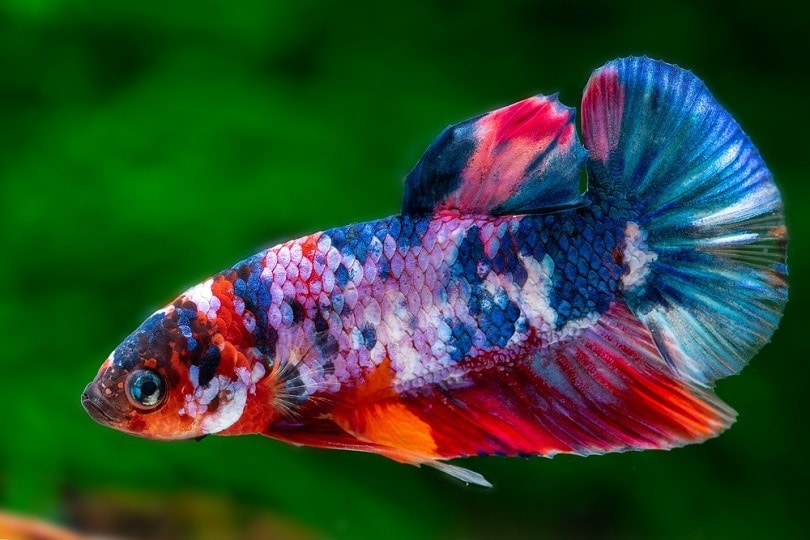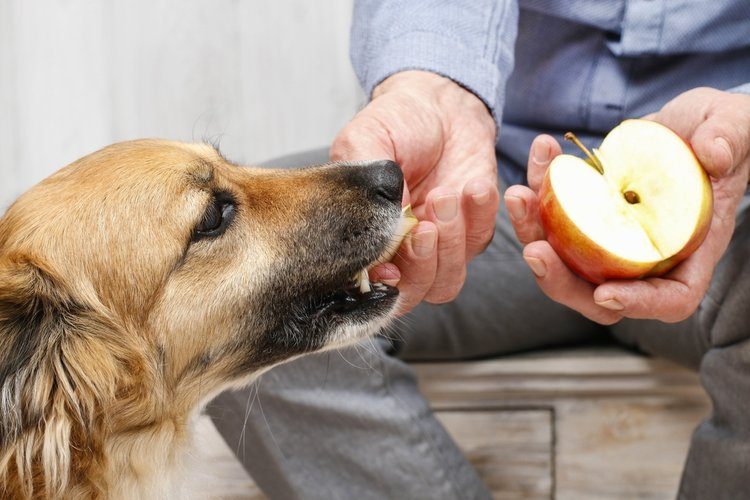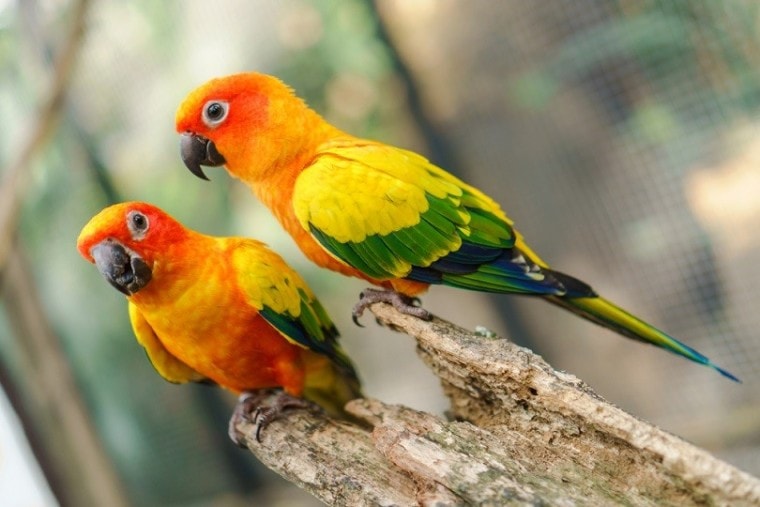
Click to Skip Ahead
Birds are fascinating creatures that come in all shapes, sizes, and colors. They can make great pets, but they can also be quite an investment. The total annual cost of owning a bird can range from $250–$1,000+ per year.
Bringing home a bird is a decision that requires forethought and planning to ensure you have the money to put toward the regular care needs of the type of bird you bring home. Different birds have different nutrition needs, some will require larger or smaller cages, and some may require regular veterinary care.
Being informed on both the care and expense of a bird before choosing a bird will help you make sure you’re ready to give a bird the best life possible.
Bringing Home a New Bird: One-Time Costs
Bringing home a new bird can be exciting, but also costly. There are many supplies your new bird will need as well as an initial vet visit to ensure your bird is healthy. Planning ahead before purchasing or adopting a bird is essential. Birds can be time-consuming and expensive, so considering all options ahead of time will help with the planning process.
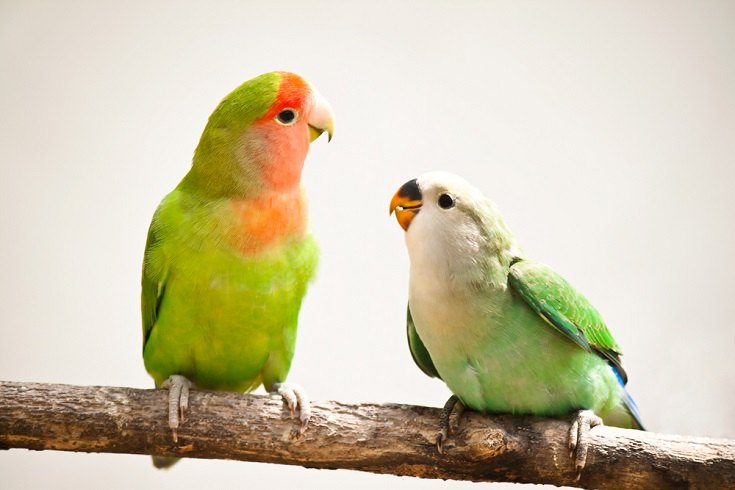
Free
There are very few ways to come by a bird for free. On occasion, you may find that someone you know no longer can care for their bird and is willing to give it away. It’s also possible that you may come across someone giving away a bird in local online marketplaces but acquiring a bird this way should be done with caution to maintain safety and ensure the bird is not ill.
Adoption
Adopting a bird that needs to be rehomed or is coming from a rescue can be a great way to get a nice bird, even a large or expensive bird like a macaw or African grey parrot. Adoption fees may run upwards of $100 depending on the type of bird. Adoption fees ensure the bird goes to a good home that is willing to provide for its needs and also support non-profits to continue rescuing animals.
Breeder
The range of cost to purchase a bird from a breeder or pet store is huge because different types of birds may be more common or rare. Birds like canaries and finches will likely cost $20–$50 while birds like macaws can cost upwards of $5,000. It’s important to ensure you are purchasing a bird from a reputable breeder and not from someone who is involved in capturing or trafficking wild birds.
| Parakeets | $15–$40 |
| Finches | $15–$100 |
| Cockatiels | $50–$150 |
| Conures | $150–$500+ |
| African Grey Parrots | $500–$2,000+ |
| Macaws | $500–$5,000+ |
Supplies
The cost of supplies for your bird will vary drastically based on the type of bird you get. A large bird is going to require a larger cage, cage cover, and perch as well as more food than a small bird. These costs may help you determine what type and size of bird you are interested in bringing home.
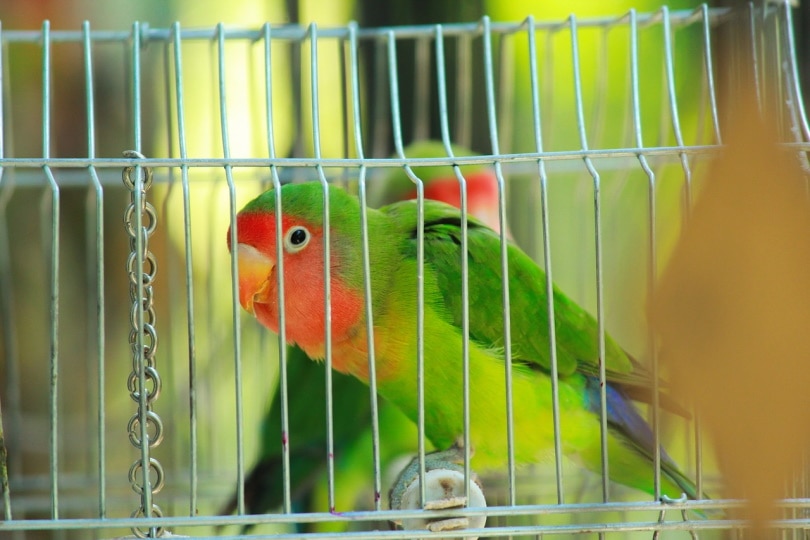
List of Bird Care Supplies and Cost
| Travel carrier | $15–$100 |
| Birdcage | $50–$1,000+ |
| Vet visit (initial) | $70–$300 |
| Vet visit (annual and maintenance) | $25–$300+ |
| Food and water feeders | $5–$15 each |
| Food | $5–$30 |
| Bedding | $5–$15 |
| Toys | $5–$30 |
| Perches | $5–$30 |
| Hygiene maintenance | $5–$30 per item |
| Beak maintenance | $2–$10 |
| Treats | $5–$15 |
| Cage cover | $15–$50+ |
| Supplements | $10–$15 |
Annual Expenses
The annual expense of owning a bird will vary based on the type and size of bird, just like when you are purchasing items to bring home a new bird. Getting an idea of how often you will need to purchase food, bedding, and health maintenance items will help you get a better idea of your annual expense. Start by asking your breeder or pet store what products they use and how often they have to purchase them.
Health Care
Your bird may only require a vet visit once a year for a nail or wing trim, which would be inexpensive compared to a visit that includes lab work or radiographs. Your bird may require annual check-ups, which is going to increase your base cost for annual spending. Your bird may require supplements or medications, which will add to this cost as well.
Check-Ups
The check-up cost for your bird will vary based on the area you are in and how much competition there is for exotic veterinarians. If your bird needs annual check-ups, you can price shop exotic or avian vets in your area, as well as researching to find the best vet to manage your bird’s health. Some birds may be stressed by being taken out of the house, so make sure to discuss this with your vet ahead of the visit.
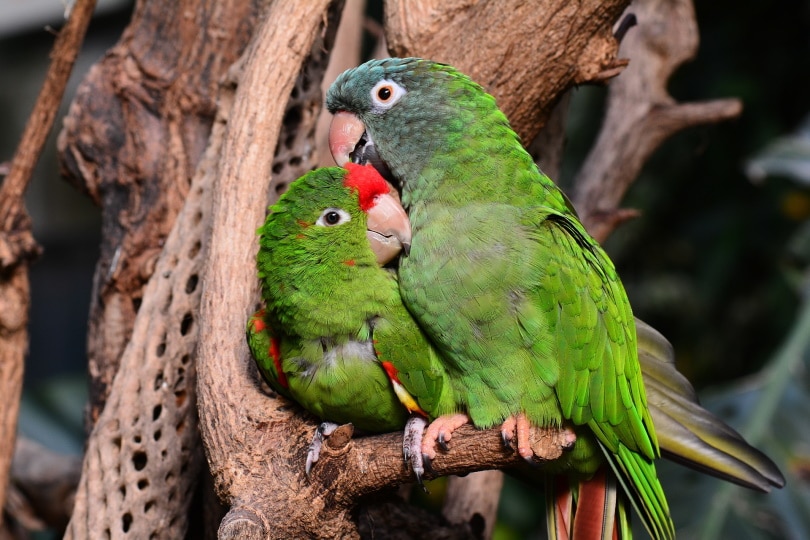
Vaccinations
Luckily, most birds don’t need vaccines. There is a vaccine for the polyomavirus, but even this vaccine only needs to be given to parrot-type birds that are high-risk for this virus. This includes birds living in pet stores and other public spaces, with breeders, or in a home with multiple other birds. This vaccine is not performed annually, so you may consider this more of an incidental cost than a necessity. If your bird requires this vaccine, they will need a set of two vaccines that usually cost between $40–$60 per shot.
Beak Care
A bird’s beak grows continuously, and some birds may require beak trimming performed by a groomer or veterinarian. Many birds will keep their beaks trimmed by chewing on items like cuttlebones. Some foods may help keep beaks trimmed as well. If allowed to overgrow, beaks can crack or cause damage to the jaw or mouth, so it’s important to monitor this closely and reach out to a professional if your bird requires beak trimming.
Treatments for Parasites
Pet birds can get parasites just like a cat or dog can. They are susceptible to mites, protozoal infections, roundworms, and other parasites. If you think your bird may have parasites of any kind, it’s important to have them examined by a veterinarian to help identify the cause. Birds with parasites may experience feather loss or pull their feathers out, develop rashes, or exhibit behavior changes. The cost of treating parasites will likely include a vet visit fee and possibly diagnostic testing as well. Luckily, treating parasites is as-needed and not a set yearly expense.
Emergencies
Planning for emergencies will ensure you are prepared for anything that might happen to your bird. Knowing where to take your bird during business hours and after hours or on holidays is essential. Emergency vet fees can get expensive quickly and will often exceed $100 just for an examination. Creating an emergency fund will help you be prepared for this type of expense.
Medications for On-Going Conditions
The potential expense for treating chronic health conditions in your bird will be dependent on the area you live in and what problem your bird has. Some conditions are chronic but treatable, so the expense may not be an annual expense, but incurable chronic conditions will last for the life of your bird. Staying in close contact with your veterinarian, ensuring your bird gets regular check-ups, and price shopping medications at reputable, licensed pharmacies will help you with this expense.

Insurance
More and more pet insurance companies are beginning to offer plans to cover birds, but these plans can be pricey. In the long run, they will save you money if your bird has routine vet visits. It will also help with incidental costs, like emergencies and medical treatments. Research and compare bird insurance companies to find a plan that works for your needs and fits your budget.
Food
The annual cost for your bird’s food is dependent on the brand of food you feed as well as where you purchase it. The size of the bird matters as well, with a macaw requiring significantly more food every year than a canary. Some birds will need their diet adjusted based on their medical needs while others need supplements or fresh foods added to their commercial bird food.
Environment Maintenance
The maintenance costs for your bird will depend on the items you purchase and how often you purchase them. Your bird may require a package of bedding every month or every 3 months. The cost of bird-proofing an area of your home to allow your bird space to explore will depend on the setup of your home and what is required to create and maintain a safe space for your bird. Perches may need to be replaced regularly if your bird is particularly hard on them.
| Bedding | $50–$360 |
| Bird-proofing areas | $20+ |
| Perches | $5–$30 |
Entertainment
Entertainment for your bird will cost whatever you want to make it cost, so have fun with it! Enrichment items, like toys and puzzles, should be rotated regularly or replaced if they are damaged. Birds are curious and many of them love to play, so providing an ever-changing selection of safe toys will keep your bird from getting bored. Bored birds may become destructive or aggressive toward you or other people or pets in the home, so keeping them happy is best for everyone. There are hundreds of types of bird toys available in all shapes and sizes, so playing with finding your bird’s likes and dislikes will be an enjoyable bonding experience for both of you.
Total Annual Cost of Owning a Bird
Owning a bird is an investment, so planning for routine expenses while setting aside money for emergencies and incidentals will help you be prepared to provide your bird with the best care possible. Your bird may not require emergency care or parasite treatment, and you may choose not to get pet insurance. Some of these expenses are within your budgetary control.

Owning a Bird on a Budget
Owning a bird on a budget can be difficult to achieve, so creating a written monthly budget will help you stay on track. It’s important to consider your potential budget before deciding to bring a bird home. It is possible to own a bird on a budget, but it needs to be carefully planned to avoid being in a tight spot. Budgeting is smart money management and in no way means you don’t care enough for your bird.
Saving Money on Bird Care
Price shopping, coupons, and research are your best friends when it comes to saving money on caring for your bird without cutting corners on their care. The products you use to stick to your budget should leave room for expenses you can’t cut, like medications and emergency care. Competitive pricing at different clinics, stores, and online shops will help you significantly when it comes to saving money on the care of your bird.
Conclusion
Owning a bird can be an enjoyable and exciting experience. However, too many people bring home birds without being prepared for their care needs.
Birds can be timid or have big personalities, and different types of birds are going to have different needs when it comes to care, toys, food, and vet care. All of this should be taken into consideration before bringing a bird home. Creating a budget will help you know which bird will fit your finances and lifestyle the best.
There are a lot of considerations when it comes to the cost of owning a bird, but with forethought and smart money management, you can work toward bringing home the bird you’ve always dreamed of!
Featured Image Credit: Naypong Studio, Shutterstock


